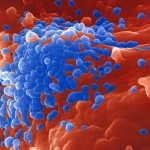Lien vers Pubmed [PMID] – 21483787
PLoS ONE 2011;6(3):e18375
Fitness interactions between mutations, referred to as epistasis, can strongly impact evolution. For RNA viruses and retroviruses with their high mutation rates, epistasis may be particularly important to overcome fitness losses due to the accumulation of deleterious mutations and thus could influence the frequency of mutants in a viral population. As human immunodeficiency virus type 1 (HIV-1) resistance to azidothymidine (AZT) requires selection of sequential mutations, it is a good system to study the impact of epistasis. Here we present a thorough analysis of a classical AZT-resistance pathway (the 41-215 cluster) of HIV-1 variants by fitness measurements in single round infection assays covering physiological drug concentrations ex vivo. The sign and value of epistasis varied and did not predict the epistatic effect on the mutant frequency. This complex behavior is explained by the fitness ranking of the variants that strongly depends on environmental factors, i.e., the presence and absence of drugs and the host cells used. Although some interactions compensate fitness losses, the observed small effect on the relative mutant frequencies suggests that epistasis might be inefficient as a buffering mechanism for fitness losses in vivo. While the use of epistasis-based hypotheses to make general assumptions on the evolutionary dynamics of viral populations is appealing, our data caution their interpretation without further knowledge on the characteristics of the viral mutant spectrum under different environmental conditions.

